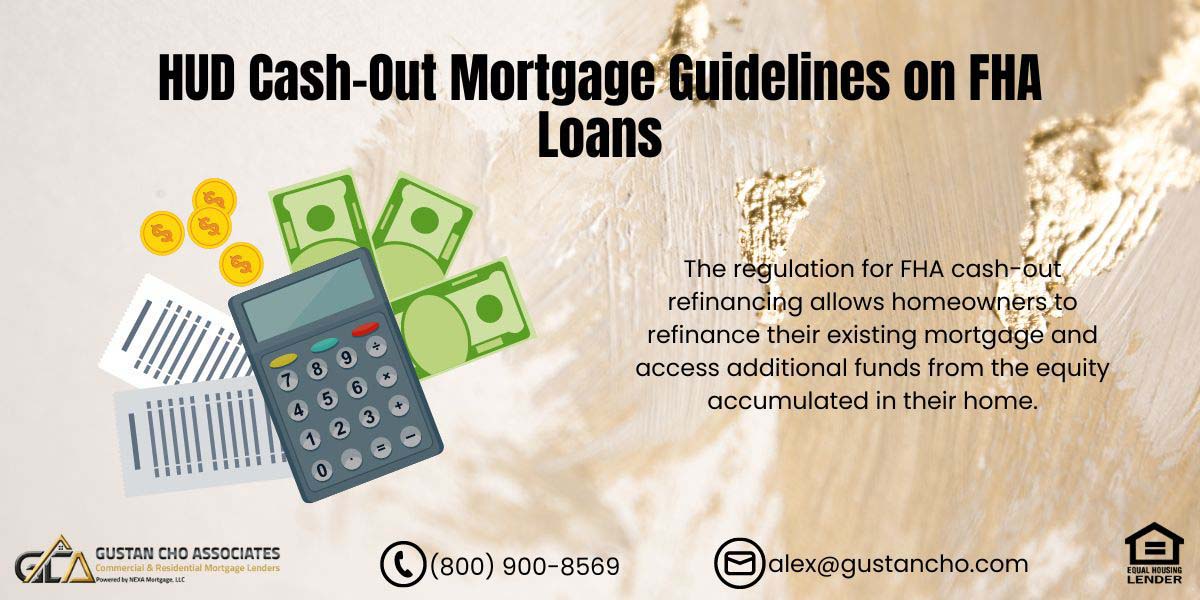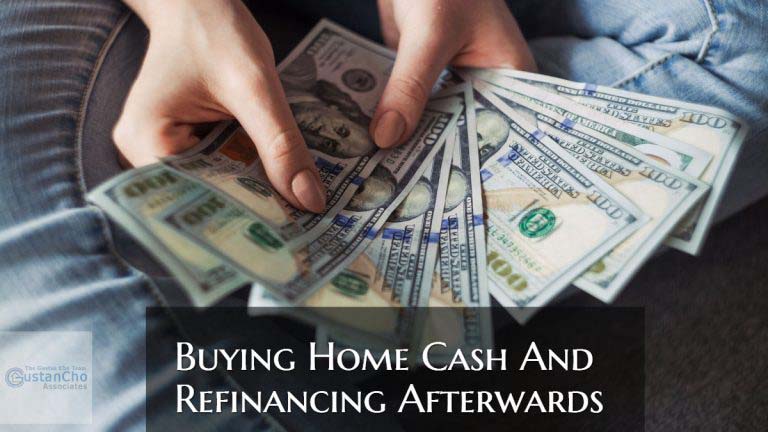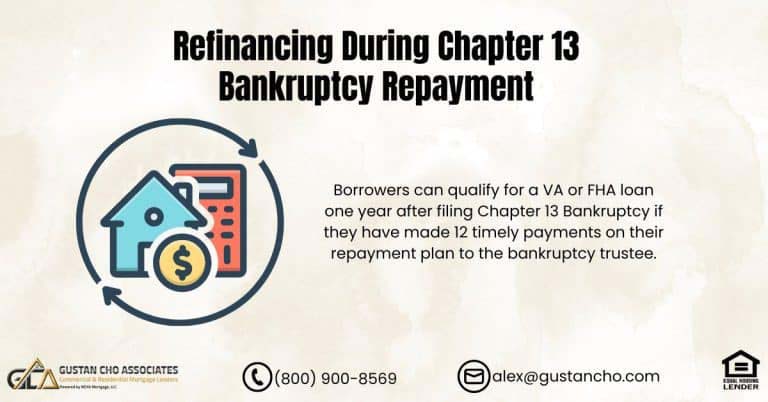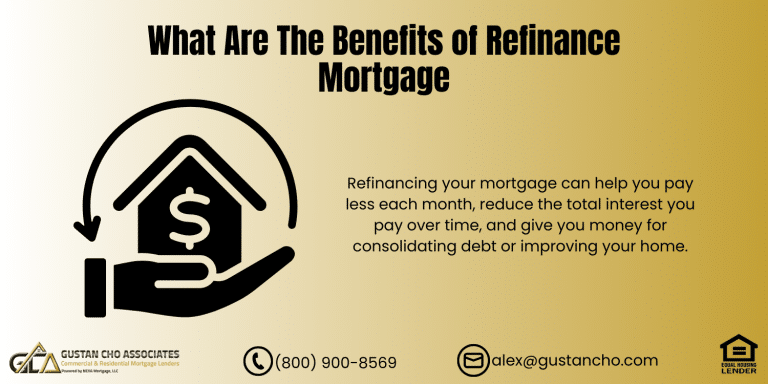This blog will cover and discuss HUD Cash-Out Mortgage Guidelines on FHA loans for 2024. Home values are rising across the country, and many homeowners who purchased their properties a few years ago are experiencing significant appreciation, with increases in home value by 20% to 30% or more. The conventional loan limits 2024 have been increased to $766,550 by the Federal Housing Finance Agency (FHFA). This marks the third consecutive year that FHFA has increased conventional loan limits, reflecting the ongoing rise in home prices.
What is the FHA Cash Out Rule?
The FHA cash-out refinance rule allows homeowners to refinance their existing mortgage while taking out additional cash from the equity they have built in their home. Here are the detailed rules and requirements for an FHA cash-out refinance as of 2024:
Eligibility Requirements
- Maximum Loan-to-Value (LTV) Ratio:
- The maximum LTV ratio for an FHA cash-out refinance is 80%. This means the new loan, including any cash taken out, can be at most 80% of the home’s appraised value.
- Minimum Credit Score:
- The typical minimum credit score required is 620, but some lenders may establish higher requirements for credit scores.
- Owner-Occupancy Requirement:
- The property must be the borrower’s primary residence. Second homes or investment properties are not qualified for FHA cash-out refinances.
- Seasoning Requirement:
- The owner should have lived in and possessed the property for at least 12 months before seeking a cash-out refinance.
- Payment History:
- Borrowers must have made all mortgage payments on time for the 12 months preceding the application.
Documentation and Appraisal
- Appraisal Requirement:
- A new appraisal is required to determine the property’s current market value. The appraisal ensures the new loan is at most 80% of the home’s appraised value.
- Income and Employment Verification:
- Full documentation of income and employment is required to demonstrate the borrower’s ability to repay the new loan. This includes recent pay stubs, tax returns, and W-2 forms.
- Debt-to-Income (DTI) Ratio:
- The borrower’s DTI ratio, including the new mortgage payment, must meet FHA guidelines. Typically, the DTI ratio should not exceed 43% to 50%, depending on compensating factors such as savings or other assets.
Mortgage Insurance Premium (MIP)
- Upfront MIP:
- Borrowers must pay a mortgage insurance premium of 1.75% of the loan amount upfront.
- Annual MIP:
- The UFMIP is one of many payments borrowers need to make. They also have to pay an annual MIP split into monthly installments. The rate of the MIP depends on the loan term, amount, and LTV ratio.
Closing Costs
- Financing Closing Costs:
- Borrowers can finance closing costs into the new loan amount, provided the total amount does not exceed the 80% LTV limit. This includes appraisal fees, title insurance, and origination fees.
Loan Terms
- Loan Terms:
- The duration of FHA cash-out refinance loans can be 15 or 30 years, based on the borrower’s preference and financial circumstances.
Other Considerations
- Cash-Out Amount:
- The borrower can receive a cash amount based on the new loan minus the payoff of the existing mortgage, along with subtracting closing costs and other fees.
- HUD-Approved Lender:
- The refinance must be done through a HUD-approved lender. Choosing a lender experienced with FHA loans is important to ensure the process goes smoothly.
These rules ensure borrowers are in a stable financial position to handle the increased loan amount and have sufficient home equity. Always consult with a HUD-approved lender for the most current and specific requirements, as guidelines can change.
Looking to Access Your Home’s Equity? Learn About HUD Cash-Out Mortgage Guidelines on FHA Loans!
Contact us today to understand the HUD guidelines and see how you can qualify for a cash-out refinance.Why FHA and Conventional Loan Limit Increasing For the Past Six Years
The Federal Housing Administration (FHA) has set new loan limits for 2024, reflecting adjustments based on housing market conditions. For single-family homes, the limit varies from $498,257 in low-cost areas to $1,149,825 in high-cost areas. These restrictions exist to maintain the affordability of FHA loans in the face of increasing home prices.
For specific situations, like those in Alaska, Hawaii, Guam, and the U.S. Virgin Islands, where construction costs are higher, the maximum loan amount for a single-unit property is increased to $1,724,725.
The FHA calculates these limits based on the Federal Housing Finance Agency’s (FHFA) conforming loan limits, setting the floor at 65% of the national conforming loan limit and the ceiling at 150%. For two-unit properties, the limits range from $637,950 in low-cost areas to $1,472,250 in high-cost areas. For three-unit properties, they range from $771,125 to $1,779,525; for four-unit properties, they range from $958,350 to $2,211,600.
These adjustments help to accommodate regional variations in housing costs, making homeownership more accessible across different parts of the country.
HUD Cash-Out Mortgage Guidelines Allows 80% LTV
Per HUD Cash-Out Mortgage Guidelines, homeowners can get cash-out up to 80% loan-to-value on FHA loans. This allows homeowners with equity in their homes to pay off their outstanding current mortgage balance and have cash proceeds up to 80% of the value of their homes. The new loan will be an FHA loan. HUD Cash-Out Mortgage Guidelines allow borrowers to use the excess cash proceeds for any purpose they want. It can be used to pay outstanding debts.
Proceeds From Cash-Out Refinance Tax-Free
Proceeds from cash-out refinance mortgages are tax-free. Homeowners do not have to pay taxes from any proceeds. Homeowners can use proceeds for any purpose they seem fit. Higher interest credit card payments, auto loans, installment loans, and student loans can be paid. By doing so, they can save tens of thousands of dollars.
They can also utilize the tax benefits of their mortgage interest paid from their new FHA loan. Homeowners who are drowning with overwhelming higher interest monthly debts can benefit from a cash-out refinance FHA mortgage. Others may benefit from the cash proceeds to do much-needed home improvements to their homes. Yet others may want to use the proceeds to take a vacation, pay for children’s weddings, or investments.
What are the Compensating Factors for FHA Loans?
Compensating factors for FHA loans are conditions or aspects of a borrower’s financial profile that can help offset weaknesses in other areas, such as a high debt-to-income (DTI) ratio or a low credit score. These factors give lenders more assurance about the borrower’s ability to repay the loan. Here are some common compensating factors for FHA loans:
- Significant Cash Reserves:
- Substantial liquid assets or savings after the loan closing can be a strong compensating factor. Typically, lenders look for reserves that can cover at least three months of mortgage payments.
- Minimal Increase in Housing Payment:
- Suppose the new mortgage payment is similar to the borrower’s current housing payment. In that case, the borrower can handle the new payment comfortably. Generally, a minimal increase is 5% to 10% more than the current payment.
- Residual Income:
- This refers to the income left over after all major expenses, including housing, are paid. A higher residual income than the minimum FHA guidelines require can compensate for higher DTI ratios.
- Large Down Payment:
- Making a down payment exceeding the FHA minimum requirement of 3.5% can be a favorable compensating factor. A larger down payment diminishes the loan-to-value (LTV) ratio, reducing the lender’s risk.
- Demonstrated Ability to Save:
- Consistent savings habits over time show financial discipline and stability, which can help offset a lower credit score or higher DTI.
- Job Stability and Employment History:
- A long and stable employment history can be a strong compensating factor, especially with the same employer or in the same industry. It indicates reliable income and employment stability.
- Credit History:
- A strong and consistent credit history, timely payments, and low credit utilization can mitigate other risk factors. This includes having few or no derogatory marks, such as late payments, collections, or bankruptcies.
These compensating factors help lenders assess the overall risk of the loan and the borrower’s ability to repay it, often allowing borrowers to qualify for an FHA loan even if they do not meet all standard requirements perfectly. BorrBorrowers must have a unique financial situation with their lender to identify which compensating factors might apply to their loan application.
Need Cash From Your Home’s Equity? Let Us Guide You Through the HUD Cash-Out Mortgage Guidelines!
Reach out now to explore the HUD guidelines and start the process for your FHA cash-out refinance.Paying High Interest Credit Cards With Proceeds From FHA Cash-Out Refinance
The greatest benefit for homeowners with equity in their homes to do a cash-out refinance mortgage is to pay outstanding high-interest debts. Statistics prove that over 80% of American workers live paycheck to paycheck. A large percentage of American workers do not have more than three months of reserves to be able to pay their monthly bills.
Most workers will find it impossible to pay outstanding credit card balances. They often struggle with making the bare minimum monthly credit card payments with very high interest. Car payments are high monthly expenses due to the shorter amortization term.
Credit Card Debt By American Consumers
Most Americans have credit card debts with high interest. Credit card interest rates vary from a low of 9.99% to 29.99%. The average APR on average revolving credit cards is 15.98% according to the Federal Reserve Board. Federal Reserve Board estimates that revolving credit balances are $1.04 trillion.
The American Bankers Association claims that 44% of account holders keep a monthly credit card balance every month. Consumers normally just pay the bare minimum payment due. Cash-Out Refinance Loans may be the perfect solution to pay outstanding credit card debts with double digit interest.
HUD Cash-Out Mortgage Guidelines And Qualification Requirements
Gustan Cho Associates is a mortgage company that holds licenses in 48 states and does not impose additional requirements on government and FHA loans. We strictly adhere to HUD Cash-Out Mortgage Guidelines without adding any additional overlays. Here are the basic HUD Cash-Out Mortgage Guidelines required by homeowners for 2024:
- No Net Tangible Benefit Requirement: According to HUD Cash-Out Mortgage Guidelines, there is no requirement for a net tangible benefit on cash-out mortgages.
- Maximum Loan-to-Value (LTV): The maximum LTV ratio is capped at 80%.
- Debt-to-Income (DTI) Ratios: To get Automated Underwriting System (AUS) approval, the maximum front-end DTI ratio is 46.9%, and the maximum back-end DTI ratio is 56.9%.
- Credit Scores and Mortgage Rates: Higher credit scores generally lead to lower mortgage rates. If they receive AUS approval, borrowers with credit scores as low as 500 can be eligible for FHA loans.
- FHA Loan Calculation: A new FHA loan would be 80% of the appraised value plus the FHA upfront mortgage insurance premium (MIP).
- Payment History: Homeowners must have timely payments on all credit tradelines for the past 12 months.
- Manual Underwriting: Manual underwriting is available for borrowers who may only meet some automated criteria.
These guidelines ensure borrowers meet specific financial criteria and maintain a consistent payment history to qualify for FHA cash-out refinance loans.
HUD Cash-Out Mortgage Guidelines On Manual Underwriting
HUD Cash-Out Mortgage Guidelines allow manual underwriting. Borrowers in an active Chapter 13 Bankruptcy Repayment Plan can qualify for FHA Loans under manual underwriting. With the proceeds, they can pay outstanding Chapter 13 debt and get their bankruptcy discharged earlier than later. Please contact us at Gustan Cho Associates at 800-900-8569 or text us for a faster response. Or email us at gcho@gustancho.com. Gustan Cho Associates is available 7 days a week, evenings, weekends, and holidays.
Ready to Refinance? Discover HUD Cash-Out Mortgage Guidelines on FHA Loans!
Contact us today to learn about the HUD guidelines and how we can help you qualify.Reason For HUD Cash-Out Guidelines Changes
Due to the 85% Loan-to-Value (LTV) HUD Cash-Out Mortgage Guidelines, many homeowners have taken advantage of cash-out refinances on FHA loans amidst the recent surge in home values. Home values have steadily increased over the past three years, with no signs of correction.
HUD expressed worry due to the high number of FHA cash-out refinances. Over the last three years, HUD and the Federal Housing Finance Agency (FHFA) have raised FHA and conventional loan limits to keep up with the increasing home prices.
For example, the 2024 FHA loan limit is capped at $498,257 for a one-unit property in low-cost areas and $1,149,825 in high-cost areas. The 2024 conforming loan limit for a single-unit property in the contiguous 48 states is $766,550. Higher limits apply in high-cost areas and special exception regions such as Alaska, Hawaii, Guam, and the U.S. Virgin Islands.
Home appraisal values have risen substantially from the 2008 real estate market crash to the present, resulting in many homeowners having considerable equity in their homes due to the sudden increase in home prices.
Does The New HUD Cash-Out Guidelines Require FHA MIP?
With conventional loans, private mortgage insurance (PMI) is not required on loan to values at 80% LTV or lower.
- Do the new HUD Cash-Out Guidelines require FHA mortgage insurance premium if the LTV is 80% or less?
- All FHA mortgages mandate a one time upfront FHA MIP of 1.75% and an annual FHA MIP of 0.85%
- FHA MIP is mandatory on all 30-year fixed-rate FHA Loans
- If borrowers are borrowing with 10% down payment and/or 90% LTV, FHA MIP can be canceled in 11 years
- Over 90% LTV, then the FHA MIP is required for the life of the 30-year FHA loan term
- The 80% LTV is for cash-out refinances only
Borrowers can have higher loan to values on FHA Streamlines, rate and term loans, and FHA purchase loans.
HUD Cash-Out Guidelines Versus Other Loan Programs
As of 2024, the HUD Cash-Out Mortgage Guidelines stipulate that FHA cash-out refinances are capped at 80% Loan-to-Value (LTV). This guideline has been in effect since September 1, 2019. Following HUD’s lead, the Department of Veterans Affairs (VA) lowered its cash-out refinance LTV from 100% to 90%.
The LTV limit for owner-occupied primary residences is 80% for conventional loans by Fannie Mae and Freddie Mac. The LTV limit for cash-out refinances is capped at 75% for two-unit properties. Second homes also have a cash-out refinance LTV cap of 75%. Rental properties have different limits; single-unit rental properties are capped at 75% LTV, while two are capped at 70% LTV.
FAQs: HUD Cash-Out Mortgage Guidelines on FHA Loans
-
1. What is the FHA Cash-Out Rule? The regulation for FHA cash-out refinancing allows homeowners to refinance their existing mortgage and access additional funds from the equity accumulated in their home. The detailed rules and requirements for an FHA cash-out refinance as of 2024 include a maximum Loan-to-Value (LTV) ratio of 80%, a minimum credit score typically set at 620, and an owner-occupancy requirement. The borrower must have owned and lived in the property for at least 12 months and made all mortgage payments on time for the preceding 12 months.
-
2. What are the eligibility requirements for an FHA cash-out refinance? To be eligible for an FHA cash-out refinance in 2024, several criteria must be met. Firstly, you can only borrow up to a maximum loan-to-value (LTV) ratio of 80%. You’ll also need to have a minimum credit score of typically 620. Furthermore, the property in question must be your main residence. It would be helpful to have both owned and lived in the property for at least 12 months before applying. Additionally, all your mortgage payments during those 12 months before applying must have been made on time.
-
3. What documentation is required for an FHA cash-out refinance? Required documentation includes a new appraisal to determine the property’s current market value, full documentation of income and employment (such as recent pay stubs, tax returns, and W-2 forms), and verification that the borrower’s Debt-to-Income (DTI) ratio meets FHA guidelines, typically not exceeding 43% to 50%.
-
4. What are the Mortgage Insurance Premium (MIP) requirements for FHA cash-out refinances? Borrowers must pay an upfront MIP of 1.75% of the loan amount. Additionally, an annual MIP is divided into monthly installments, with the rate depending on the loan term, amount, and LTV ratio.
-
5. Can closing costs be financed in an FHA cash-out refinance? Yes, borrowers can finance closing costs into the new loan amount, provided the total amount does not exceed the 80% LTV limit. This includes appraisal fees, title insurance, and origination fees.
-
6. What are the loan terms for an FHA cash-out refinance? The FHA cash-out refinance loans can be 15 to 30 years, based on the borrower’s preference and financial circumstances, offering flexibility for their repayment period.
-
7. How much cash can be taken out in an FHA cash-out refinance? The borrower can receive a cash amount based on the new loan minus the payoff of the existing mortgage and subtracting closing costs and other fees.
-
8. Do FHA cash-out refinances need to be done through a HUD-approved lender? Yes, the refinance must be done through a HUD-approved lender. Choosing a lender experienced with FHA loans is important to ensure the process goes smoothly.
-
9. Why have FHA and conventional loan limits been increasing? The Federal Housing Administration (FHA) and the Federal Housing Finance Agency (FHFA) have increased loan limits due to rising home prices. The loan limits for single-family homes in 2024 vary from $498,257 in affordable areas to $1,149,825 in expensive areas, as specified for FHA loans. These adjustments help accommodate regional variations in housing costs, making homeownership more accessible across different parts of the country.
-
10. What are the compensating factors for FHA loans? FHA loan compensating factors include cash reserves, stable housing payment, residual income, large down payment, demonstrated ability to save, job stability, employment history, and strong credit history. These factors can offset a high debt-to-income ratio or poor credit score, giving lenders confidence in the borrower’s ability to repay the loan.
If you have any questions about HUD Cash-Out Mortgage Guidelines on FHA Loans or you need to qualify for FHA loans with a lender with no overlays, please contact us at 800-900-8569. Text us for a faster response. Or email us at alex@gustancho.com. The team at Gustan Cho Associates is available 7 days a week, on evenings, weekends, and holidays.
This blog about HUD Cash-Out Mortgage Guidelines on FHA Loans was updated on June 11th, 2024.









